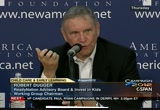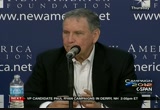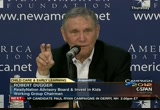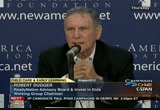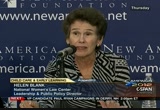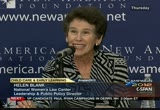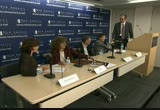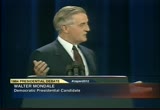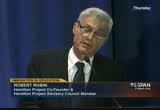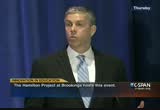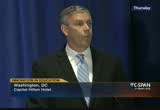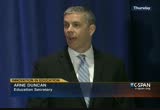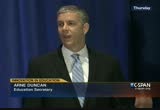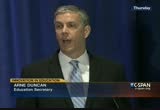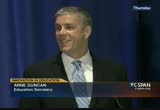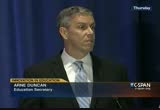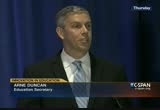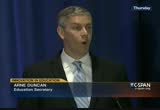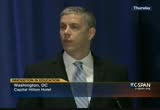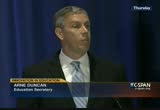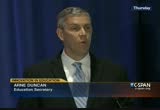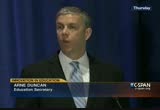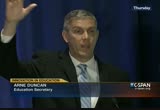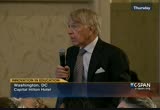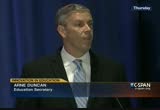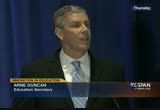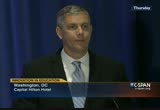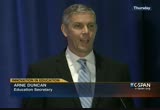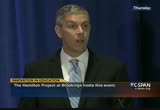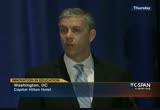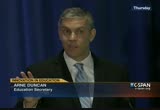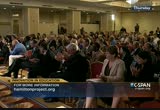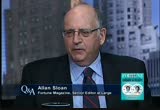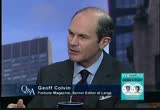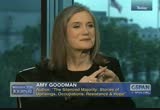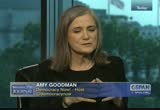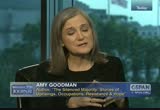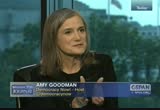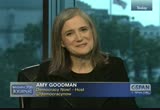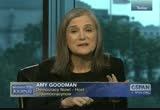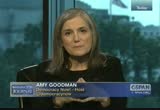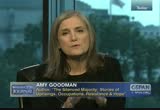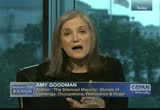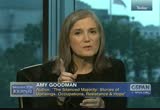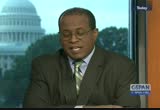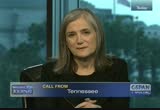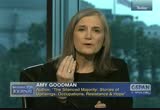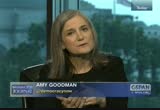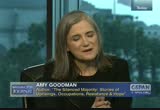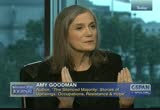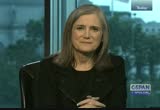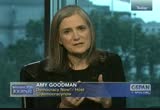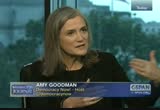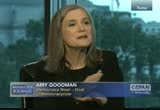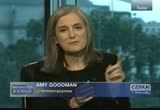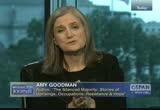tv Washington This Week CSPAN September 29, 2012 2:00pm-3:36pm EDT
2:00 pm
it has changed from being a recipient and passive and accommodative to being assertive, aggressive, and insistence that the country do what they should do, which makes sense economically and civilly. the reason it has not been done, the reason it has not been done is first a question of money. that is very clear. the money question has not been expressed yet as a simple question. it is not quite recognized get -- yet how vitally dependent the country is on a trained, educated, likable, young adult population. we have not quite recognized the deficit we have.
2:01 pm
as for the state level, a lot has happened. we work at the state level. we attempt to put together coalitions that recognize the importance of educating kids from conception to kindergarten. we are finding more business people who get the reality. they are understanding the situation and are increasingly ready to take action. in the area lisa pointed to, educating early solves educational problems. we published a report last march. it is on the website. it is a way to reduce special education costs. we know quality pre-kindergarten provided to 100 kids yields in
2:02 pm
reduction in special education costs alone enough to pay for the services. at the state level, there is an understanding that takes place that people can act on. it can better be done on the school district level. the power of technology is enabling people at local levels to act in ways they cannot at the federal level. as they act at the local and state level, it becomes clear that the federal level what needs to be done. the beginnings of this process are sufficiently still knew that it would be a third reason why we should not be surprised of the relative inaction at the federal level. but at the state level, a lot is going on. lisa and david are doing is
2:03 pm
informing and energizing this to make it easier for those trying to organize in those states. i am very encouraged by what is happening at the local and state level. >> let me give the simple answer to your question. it is something everyone can do when they leave this room. go to the website. there are two things you can do. there is one box that shows you how to tweet the host of the debates and ask them to ask a question about reducing poverty and addressing early childhood care. if we get enough people to do it, they may ask a question. there's also a map encouraging you to ask everyone you know to get state and federal elected
2:04 pm
officials into child care centers. then they can put a pen on the map. i agree we need to be more militant. we used to use those techniques in the 1990 and 1996 reauthorization. we have to be more demanding. i believe this is a campaign in congress not saying or doing much of anything. it is a challenge to get anything constructive said. we have to push more. i would disagree. i think there is interesting activity going on in the state. there is a lot of shallow activity going on in the state and some very serious situations in terms of state funding for child care and early education. in some places where it may look good systemwide, it is precarious in terms of oil will be able to maintain.
2:05 pm
my final remark, since i was allowed to have the last word, is to the business leaders. i would urge all of the business leaders who have stepped up to support early childhood to also stepped out to the tax-writing committees and point out all of the loopholes we can close and all of the increases that are viable and will provide the revenues we need to provide early childhood system our children and families deserve. i think that is doable. >> what a great panel. join me in saying thank you to all of our speakers today. [applause] we have are marching orders. -- we have our marching orders. we are adjourned. have a good afternoon. [captioning performed by national captioning institute] [captions copyright national
2:06 pm
cable satellite corp. 2012] >> mr. president, do you think middle income americans are over or under taxed? >> i was not going to say this, but i cannot help it. there you go again. [laughter] i do not have a plan to tax or increase taxes. i am not going to increase taxes. i can understand why you are. as a senator, you voted 16 times to increase taxes. i believe our problem has not been that anybody in our country is under text. -- under taxed. had a 25% tax cut across the board that maintained the same productivity of attacks by structure. as a matter of fact, it happens in administering the taxes,
2:07 pm
those above $50,000 to not get quite as big a tax cut percentage wise as those from $50,000 down. those people. two -- those people paid 2/3 of the taxes and got 2/3 of the tax cuts. >> you said, there you go again. do you remember the last time you said it? you said it when president carter said you were going to cut medicare. you said, there you go again, mr. president. what did you do after the election? you tried to cut $20 billion out of medicare. [applause] when you say, there you go again. people remember this. people will remember you signed the biggest tax increase in the history of california and the biggest tax increase in the history of the united states. what are you going to do?
2:08 pm
you have a $260 billion deficit. you will not slow defense spending. you refuse to do that. >> mr. mondale, your time is up. >> as we get closer to the first presidential debate, we are looking back at the dates from our archives starting with president reagan and walter mondale at 7:00 eastern. later in the evening, the 1992 debate between george bush, bill clinton, and prospero -- ross perot. >> republican vice president joe candidate paul ryan is making campaign stops in new hampshire and ohio. here is his campaign rally from this morning in new hampshire. he speaks for about half an hour.
2:10 pm
thank you for hosting us. thank you for sending mitt romney to the white house and barack obama back to chicago. [applause] it is so great to be back here. this is a beautiful place and a beautiful state. i brought my beautiful wife with me as well. [applause] she is here with my sister and brother-in-law. they live right over the border in boston. i do not know if that is a good or bad thing to everybody here. my sister lives in boston. she works for dunkin brands. this man knows how to balance a budget, cut spending, it knows fiscal responsibility. he is one of the leaders helping us to do that. that is charlie bass as well.
2:11 pm
let's give them a round of applause. [applause] friends, we have a big trees to make. -- we have a big choice to make. this is not your ordinary election. we are not just deciding who will be the next president for four years. we are deciding what kind of country we will have and what kind of people we will be for a generation. this is a high-stakes election. if we have four more years like the last four years, we continue stagnation. the choice is very clear. do we want a dynamic, growing economy that fosters opportunity or do we want a stagnant economy that fosters dependency? that is not who we are. we want to live free and prosper.
2:12 pm
we want to believe. [applause] when president obama came into office, he inherited a tough situation. the problem is the obama economic agenda failed, not because it was stopped. it failed because it was passed. do not forget this. he came into office with the ability to pass anything of his choosing. he did that. remember the stimulus? remember the idea that if we borrow $831 billion and spend it on pet projects and interest groups, they said unemployment would never reach 8%. we would be growing at 4% a year right now. unemployment has been above 8% for 43 months. our economy last quarter stalled
2:13 pm
at 1.3%. what is worse for all of these promises about cutting the deficit, growing the economy, bringing people together in a bipartisan fashion -- i will not even get into the oceans and tides. [laughter] i have heard that one. all of these promises were made. the idea of how been changed. it sounded good. -- the idea of hope and change. it sounded good. the ideas are the old ideas that have failed time and again. borrowing and spending and regulating and taxing and printing money, all of these things do not lead to prosperity. these policies say take power from people, money from families and successful small businesses, send it to washington and they decide.
2:14 pm
that does not work. when you look at where we are rightow, we have 23 million men and women in this country struggling for work. we have 15% of our fellow citizens living in poverty. that is the highest rate in a generation. women in poverty are at a 17- year high. the economy is barely growing. the president has no ideas on how to grow again. he is saying i want to do more of the same. i want another round of stimulus with tax increases and job creators. we need a leader. we need leadership to get the country back on track, to put the right ideas in place. that leader is mitt romney. that man is going to get our country back on the right track. [cheers and applause]
2:15 pm
very rarely do we see a situation where the man and the moment meet so well. this is a man who has shown one thing for his accomplishments, a decisive, principled leadership. that is the kind of man we need. [applause] it is not good enough for us to complain. we are not simply saying hire us because the other guy is inadequate and failed. we want to earn this victory. we want to deserve this victory. what we need as a country is a mandate and the moral authority to get us back on the right track and put the right ideas in place to get people out of poverty, out of living paycheck to paycheck. to get people back into jobs with higher pay so they have economic security so we can get the economy growing and restore
2:16 pm
the promise of the american dream for everybody. we are offering very specific, bold ideas to fix the big problems in this country. no. 1, we have so much energy in this country. let's get that energy in this country, create jobs. that will build prosperity. oil, gas, coal, nuclear, renewables, all of the above. the obama administration is standing in a way of what could be a promising explosion of energy. we have so much oil and gas because of new technology that we know how to get without harming the environment. this puts people to work and creates manufacturing jobs. it lowers gas prices. it lowers the cost to heat your home in the winter, to cool it
2:17 pm
in the summer, the electricity we pay. that means your paycheck goes farther. people living on fixed income have more income to live on. this is important. with an energy policy like the keystone pipeline, opening our land for development, we can stop sending our money to the middle east. it helps our economy and paychecks. [applause] another area -- we have all these people in between jobs. for every person who got a job last month, nearly four people stopped looking for a job. we are slipping behind. what we see when we look at the faces, talk to the people, see the names, it is a person in their 30's, 40's, 50's, early 60's.
2:18 pm
i will get to the person in their 20's in a minute. it is a person who came out of school, got a career, got a good job and then their job with the way. now they do not have anything to replace it with. we need to help people in the middle of their careers to get the skills they need for the job they want that gives them real economic security. it gives them a good job with better take home pay to provide for their families. [applause] we need to clean up our education system. we need to make sure we do not be the bureaucracy. we need to give people the choice to go to the best schools to get the skills they need to get their job on the -- life on the right path. we have to recognize 95% of the world's people live outside this country. if we want could pay and jobs,
2:19 pm
we need to grow and make more things in america and sell them overseas. we need trade that works for us. we need to open markets. we need to hold country's accountable when they try to take our jobs and property. another thing, i have got to tell you, you cannot grow this economy if you do not realize most of our jobs in this economy come from small businesses we need to champion small businesses. we need to make sure the small businesses know that the government is not going to pull the rug out from under them. talk to a small-business person, a manufacturer, someone holding on a hoping they do not have to lay off the next round of people. they see regulation after regulation coming from washington. they have no idea what it will
2:20 pm
cost them. they are worried about going forward because of hidden costs. then they see our president promising the top tax rate on small businesses goes to about 40%. that only pays for 8% of his proposed deficit spending. overseas, where i come from, that means make superior. we both live near canada. the canadians have this figured out. other countries have this figured out. canadians lowered taxes on businesses to 15%. president obama wants the tax rate on our successful small businesses and job creators above 40%. when we tax our job creators at much higher tax rates than foreign competitors, we went --
2:21 pm
we win and they lose. we do not want to tax the small businesses. we want them to hire more people. that is essential. none of this is going to work, no business will be confident to take the risk to hire people, give the raises and job security, if they see the government borrowing and spending like it is. we cannot keep borrowing 36 cents of every dollar the government spends. we cannot keep the federal reserve doing what it is doing. we cannot keep looking our children in the eye knowing we're going to give them a diminished future because we are spending their money today. it is a simple idea.
2:22 pm
mitt romney and i are going to bring it to washington. we have to stop spending money we do not have. we must cut spending. we must get the balanced budget. we must get the debt under control. this is that not only hurt our economy with the threat of higher interest rates,, the losing dollar, and much higher tax rates. we know we're giving our children and grandchildren a lower standard of living and diminished future. we have never done that in this country before. my dad said a couple of things that stuck with me. he would say to me, you are either part of the problem or part of the solution. president obama has become part of the problem. mitt romney is the solution. [applause]
2:23 pm
the other thing he said is in this country, every generation of americans fixes their problems so they can leave the next generation better off. that is the american legacy. for the first time in the history of our country, we know if we stick with the same failed policies of the last four years, we guarantee our children get a diminished future. we cannot allow that to happen. it is our moral obligation to save the american dream for our children and grandchildren. [applause] this is why we need leadership. take a look at mitt romney's record, history, the man he is, and then you will know this is the kind of man we need to lead us. mitt romney knows firsthand what
2:24 pm
it takes to grow the economy, to grow businesses, and create jobs. he has helped to create tens of thousands of jobs. being successful in business is a good thing. we admire that. we do not resent that. we want more of that. we want a successful business people. this is the kind of experience we need. he is a man who has a history of taking tough challenges, turning around difficult organizations and making them work. the olympics is one example. just over the border in massachusetts, that is not a ruby red republican state. this is a republican who was governor of a democratic state. 87% of the legislators he served with were democrats. did he demonize and divide? no, he treated people with
2:25 pm
respect. he reached across the aisle without compromising principles. he balanced the budget without raising taxes. that is the kind of leadership we need. [applause] under president obama, household income, and families in america have gone down by more than $4,000 over the last four years. the middle class is shrinking and falling behind. under mitt romney when he was governor of massachusetts, household income went up by 5000 old. look at what president obama did on the budget. nothing except pro and spend. as a result of his abdication of leadership and seeing the most predictable economic crisis in our history and not fixing it, our credit rating was downgraded for the first time in our history. when mitt romney was governor, the credit rating on his state
2:26 pm
was upgraded. that is the kind of change we will get with the mitt romney presidency. [applause] we need to tackle our nation's challenges before they tackle us. we need to save and strengthen medicare and social security. your putting ideas on the table of how to do that. we will not scare seniors. we will save the benefits for seniors and my generation so these promises are kept. we believe in strong national defense. we do not agree with the president's reckless defense cuts because we believe in peace through strength. [applause] in the live free or die state, we know this to be true. we want to be in control of our own health care. to do that, we have to repeal and replace obamacare. [applause]
2:27 pm
the choice is clear. we can either stick with the failed policies of the last four years for the next four years, which gives us a stagnant economy and foster's government dependency, or we can fix these problems. we can bring the leadership we are lacking and have a dynamic, growing economy that produces opportunity, a. mobility, and self-sufficiency, and economic growth. higher take-home pay, a stronger middle-class, and getting people out of poverty and back into the middle class growing economic security. this is doable. we can do this. this election is not just about material issues. this election is about the fiber of our society. this election is about the kind of people we will be and the kind of country we will have. this country is an idea.
2:28 pm
that is something we can never forget. it is not immune to california. it is to run -- it is not just a nation with a flag. it is a nation founded on an idea that is precious. it can slip away from us defeat generation does not defend the idea. the idea is precious. the declaration of independence said it better than anybody can say it. our rights come from nature and nature's god, not from government. the minute we forget that idea, the minute we lose our country. our founders secured this. every veteran cents has put on the uniform to defend the idea that we can live in peace and freedom. we thank them for what they've done to give us this country. that is why we have to win. that is why we're going to win.
2:29 pm
winston churchill said it best. the americans can be counted upon to do the right thing, but only after they have exhausted all other possibilities. i think that is where we are. we are at the fork in the road. we have a choice to make. mitt romney and i are giving you the choice. it is a clear choice of two different features -- futures. it is not too late to get it right and turn the economy around. it is not too late to secure for our children the promise of america that our parents secured for us. we can do this. we can get this together. we can put this together. together, we can get this done. you have an enormous responsibility and the enormous opportunity.
2:30 pm
a handful of states will settle this. you understand that. your the granite state. you have had presidential candidates in your kitchen. you are used to this. that is why you know the responsibility you have. you have the responsibility to talk to fellow citizens, to get the people who like unchanged but are demoralized, to show them we have a better path. we have better ideas. we will reapply our founding principles. we will not duck the tough issues. we're going to lead. mitt romney will not in the next four years blaming other people. he will take responsibility. we will not try to replace our founding principles. we will reapply our founding principles. we can do this. we need your help. we can get this done. thank you so much. appreciate it, everybody. [applause]
2:35 pm
2:36 pm
party platform and the challenges of running as a third-party candidate. that is followed by former virginia rep. and constitution candidated -- virgil goode. then a look at the history of political parties. "washington journal" live at 7:00 eastern on c-span. the education secretary talked about public and charter schools and progress in education at an all-day education summit hosted by the brookings institution hamilton project. he spoke for about half an hour. >> on a truly special notes with u.s. secretary of education on
2:37 pm
the duncan --arne duncan. under his leadership, the department of education has worked to increase college graduation rates and expect by the end of the decade to have the highest rate for our country. in that context of secured increases of pell grants and launched an income-based student loan repayment program. as you know, secretary duncan has put in place and moved forward a reform effort, raced to the top, and also investing in education. secretary duncan has also led the department in investing substantially in low performing schools throughout the country, a subject we have discussed today. secretary duncan has been immersed in public education throughout his career. he was the chief executive
2:38 pm
officer of the chicago public school system. he united the education community behind the school reform in chicago. following his remarks, secretary duncan will take questions. it is my enormous pleasure to welcome to the podium the united states secretary -- i almost said secretary of the treasury. [laughter] united states secretary of education arne duncan. [applause] >> thank you for the kind introduction. you do not want me at the treasury. i am happy where i am. i would like to have a conversation with you. i am thrilled to have this audience and community focused on education. we think there is nothing more important for the country to be engaged in. i believe we have a chance to break through any fundamental way. i will give you a snapshot of
2:39 pm
where i think we are, where we're trying to go, and what the next steps are. a couple of numbers haunt me. a 25% dropout rate in this country. that is a million kids leaving our schools each year. no good jobs out there for them. in many of our african and latino communities, that is 60%. we are devastating families and entire communities unless we fundamentally challenge that. we used to lead the world in college graduation rates. today we are 14. 13 other countries have passed us by. we wonder why we're struggling economically. i continue to think about the skills gap. we have as many as 2 million high skilled jobs we can not bill. we have to look at ourselves in the mirror and say, what are we doing to close the gap? the economic imperative to get better.
2:40 pm
people have talked about the dropout rate having the effect of a permanent recession on our economy. the employment rate for college graduates versus high-school graduates versus high-school dropouts. the dividing line is staggering. economic imperative, issue of national security, which more people are becoming aware of. 75% of our young people cannot qualify for military service. they are academically unprepared, physically unfit, or have a criminal record. that is not good enough. we went to topeka, kan., the site of brown versus board. i said i think this is the civil rights issue of our generation. the dividing line is not race or class, but around educational opportunity. if we're serious about closing
2:41 pm
the achievement gap, we have to close the opportunity gap. i do not think we have had anything near the sense of urgency and commitment to closing those gaps that we need to. to look at the staggering inequities and inequalities, we have to get better faster. all those things compel us to act. the president has provided leadership. he understands what is at stake. congress has been supportive. we have to work on this together and put politics and the ideology aside. we have to educate our way to a better economy. i talk about a cradle to career agenda. we have to start with early childhood education. i could make a compelling case that is the best investment we can make. if we can get our babies into kindergarten and ready to read, we start to close the gaps. if we do not do that, we're playing catch-up.
2:42 pm
we play catch up at every level of the education system. many of our colleges today, 50% of young people are taking remedial classes in college. they are not ready. investment in early childhood education is important. our department of education has been part of the problem. one of the areas where we did not invest in early childhood education. with congress's support, over $16 million going to states willing to increase access and going into disadvantaged communities. we will not see results today or next year. but over the next 15 years, the implications are huge. reform is the next step. we were able to save 400,000 jobs. teachers and educators. we lost three in a thousand jobs as a country. i do believe we stave off an education catastrophe.
2:43 pm
it would have been stunning to see what would have happened to class size and schools going to four day weeks. it would have been going in the wrong direction if we have allowed those teachers to lead our schools. would love to have been able to do more, but i think it's stave off what would have been an absolute disaster. 46 states voluntarily raised standards. that is a game changer. i think this is the first time in our history a child in mississippi and a child in massachusetts will be held to the same yardstick. teaching to high standards is going to take a lot of effort. we have to be more thoughtful in professional development. giving parents to understand this. thinking about how students understand the work level required. there's a massive implementation and communications challenge.
2:44 pm
we know that many states dummied it down standards because it made politicians look good. bad for children and the country. politicians had political benefit for saying the results were better. to see states moving the opposite direction is a big deal. tennessee before they raised standards were saying 91% of students were proficient in fourth grade math. when they raised standards, it went to 38%. the achievement gaps doubled. for the first time, there were telling the truth. they were setting an honest baseline. we can work together from that point. implementation is a big challenge moving forward. i could not be more proud of the leadership of political leaders, superintendents, folks across the standard -- country doing the right thing in raising standards.
2:45 pm
race to the top has gotten all the press. that was $4 billion for the country. folks have not focused enough on the fact we also investigate -- invested $4 billion in the bottom 5% of schools. we have 1300 schools across the country in the process of being turned around. it is early, but many of those schools are seeing double-digit gains in reading and math scores. graduation rates up significantly. in high school and topeka, they had a 90% reduction in violent incidents and discipline problems. students are talking about going on to college. massive amounts of change. at the local level, people are collaborating with almost no drama.
2:46 pm
the press does not pay attention. this has been an unbelievable profile in courage. the nea is helping to turnaround these schools. we visited a school where they brought in more social workers. the head of the union stood up and said this is the hardest thing i have done in my career, but i had to do it. the kids deserve it. i have talked to and visited dozens of schools around the country. i hear the students talked about what is different from today. one man told me he was a senior going on to graduate. he said it was fantastic and he wished we had done it sooner because he would have more friends with him instead of on the street. we have to push harder in this area. the waivers and flexibility provided around no child left behind has been fascinating.
2:47 pm
we wanted congress to fix the law. it is broken in many ways. i think the law was impeding progress and innovation. we have approved waivers to 33 states. we have another dozen we're working through the process. these states are showing great courage moving away from a focus on one test score but looking at how much a student is improving and looking at a set of other metrics. are the graduation rates going up? are more of the high school graduates college and career ready? are they going to college? are they persevering? some argue it is more complicated. it is more complex. it is much more comprehensive. if you have great third grade test scores. a 50% dropout rate, you are not changing students' lives. looking at long-term outcomes is a step in the right direction.
2:48 pm
in many schools, the size was high. many children were not part of the accountability system. they were invisible under no child left behind. we have states where 20,000 additional children -- they will be held accountable for results. that is a huge step in the right direction. benefits have been fantastic. we hope congress will reauthorize. the president and i stand ready to help them get there. the best thing that could happen when we get to that point is that we do not design is what in washington -- this lot in washington and we take the best ideas from the states. if we put our heads in the sand, we do a disservice to the leadership from the country. it is trying to increase access
2:49 pm
and completion rates in college. we have made a huge play around community colleges. we have put unprecedented resources behind community colleges partnering with the private sector. training is leading to real jobs. some of the most inspiring visits are to the community colleges. to see 18-year olds and 58-year olds being trained for manufacturing and health care, it is amazing what community colleges are doing to drive economic revitalization. we want to invest heavily there in partnership with the department of labor. one thing i am most proud of is the increase from 6 million to 10 million pell grant recipients over the past two years. many of these young people are first generation college gores.
2:50 pm
we did that without going back to the taxpayers. we stopped subsidizing banks. we put that money into young people. that was controversial in washington. we thought it made common sense. we moved the ball a long way through that effort. we are promoting a big agenda around transparency. universities have to keep costs down. states have to continue to invest. 48 states cut funding to higher education last year. we're trying to give young people and their families basic information. there has been a paid -- op agueness around that. hopefully market pressure will come to bear. we have to continually work hard.
2:51 pm
this is not just about education. we will not have a strong country and economy if we do not strengthen what we're doing every level, early childhood through higher education. those things are linked. we want to stay focused on where we're going. continue to focus on the early childhood investment. continue to drive reform in k- 12. increase efficiencies and outcomes. think about the next generation of teachers. we've talked a lot about the respect initiative. with 1 million teachers retiring over the next six years, our ability to attract and retain great talent will shape education for the next 30. there is a once in a generation opportunity. we want to make a real profession where great talent gets rewarded. a lot of work we can do together to make a profession where we
2:52 pm
are not losing our young talent. we're going to push very hard there. on the higher education side, we have to break through on the cost issue. 40 states are cutting funding. more middle-class families are thinking college is not for them. a young girl came up to me. she was a senior in high school. she said she had a twin brother. her family is trying to decide which one to send to college. that is real. that is not a desperately poor area. no family should be in that situation. how do we get universities to keep tuition down? how do we get for the states to invest more in higher education? 80% of governors cut funding to higher education. how many cut funding for
2:53 pm
prisons? the room gets quiet one aspect question. we cannot do it by ourselves. the idea of shared responsibility, how do we step up to the plate? the president has said by 2020, we have to leave the world in college graduation rates. are we graduating young people career ready? we have the best educated work force in the world, we will have the strong country and strong economy. if we continue to beat 14th and 15th, we will continue to struggle for a long time. i will take any questions you may have. thank you for having me. [applause] you have a microphone coming. >> i am a clinical psychologist. i would like you to flesh out
2:54 pm
how you will bring in a new generation of teachers with more respect and a higher status. >> we think teachers should be leading this. we have held hundreds of town hall meetings with teachers around the country. i think the entire pipeline is broken. this is not an easy fix. we do not have the right talent pool coming in. if you look at a high performing countries, 100% of their teachers come from the top 10% of college graduates. we are at the other end. teacher training is woefully inadequate right now. 62% of young teachers tell us they are unprepared to into the classroom. if 62% of doctors said they were unprepared to practice medicine, we would have a revolution. i have been public saying we should pay teachers a lot more money. we need to have meaningful career ladders so that master
2:55 pm
teachers can stay in the profession for a long time. it is not an easy fix. we have to challenge the status quo at every level. we want to help facilitate this. you have great teachers starting to demand this. it is important we listen to them. we are calling this the respect project. the president has asked $5 billion from congress to put behind us. we have information on our website. this is where the public, unions, management, parents have mutual self-interest in getting the next generation of great talent in and doing a much better job of retaining them. >> mr. secretary, the administration and under your leadership did a series of pioneering things during this
2:56 pm
first term. you have referred to some of them. if there is a second term, can you give us a sense of -- >> when there is a second term. [laughter] >> can you give us a sense of what the agenda might be in the second term in the same context of the types of pioneering steps you have taken? >> i want us to stay focused. this is not a time for us to make left turns. continuing to invest in early childhood education is important. thinking about how you drive reform, getting better at graduation rates, reductions in dropout rates. technology can play a role. we have to crack the nut on the higher education side on having
2:57 pm
more middle-class and disadvantaged families thinking college is for them. we have to increase completion rates. at the start of the administration, we have $100 billion in recovery act money. i would love to have that each year. that is probably not realistic. i am a bigger believer in carrots than sticks. the waiver process is huge. there are lessons learned. we did that with no money. we provided more flexibility to states and how they use existing resources. how do we become a better partner to states more focused on innovation? investment innovation fund, the promise neighborhood stuff we have not talked about. if we had more financial resources, i would love to invest more. there are many canadians we have not been able to get to.
2:58 pm
i do not see us changing directions radically. one quick on the turnaround stocks, a turnaround schools and improvement grants. i talked a little bit about the data. we have 700,000 less kids today going to drop out factories than a couple of years ago. that is a huge step in the right direction. we still have so many kids going to drop out factories. we need to get that number to zero as quickly as we can. the last thing i would say is the komen for implementation is a big deal. -- common core implementation is a big deal. how we help teachers teach to higher standards will take a lot of collective work. >> i am originally a chicago
2:59 pm
public school graduate. cps has a high dropout rate, almost 50%. we have been talking about charter schools and really good public schools. how would you recommend prioritizing limited funding? do you support a school that is doing well? how does that leave monday for failing schools and charter schools in a time of lefts -- lespedeza resources? >> there are many debates in education. the debate of college versus career is crazy. we need more students prepared to go to college and into careers. we're not doing a good enough job in either of those. the skill set needed for college and her rear is similar. we waste a lot of time there. we just need more public -- good
3:00 pm
public schools in this country. if you ask a 7-year-old was kind of school they go to, they have no idea. do i have a great teacher? am i in a safe school? we need more schools like that. we need to replicate high- performance charter schools. we can learn from them. we have to share better. one thing i tried to do in chicago, i think the charter school committee has been better at replicating success. we started replicating the high performing district schools. elementary, but some college prep. more good schools are expanding, but replicating, and the more we do not tolerate failure, the more we have high performing charter schools -- we have to challenge our charter school community. there is nothing about the name
3:01 pm
charter that means quality. quality means quality. charter schools have to challenge themselves to close down or phase out what is not working. we must have a lower level tolerance of failure. our tolerance of failure has been far too high for far too long. yes, ma'am? >> i am it's a wertheim of the naval postgraduate school. i am a john dewey educated person. she tied her way through graduate school typing all of his books. i am a great believer in collaborative learning. in the complex world we live in today, just thinking if you are this good in math but do not understand anything else, i think we are all losing out on that. one of the things i have observed in public schools is that their job is to give the answer, not last the right question. my question for you is, how do
3:02 pm
we open up curiosity and allow these kids to challenge and not be penalized because their teachers do not understand the answers? their job is to say who has the answer and where do we go find it? i have been with the defense department for 35 years. getting them to talk or is donnelly is really hard and i am hoping you will do something about a -- two top horizontal the is really hard, and i am hoping you will do something about that in our education system, starting with kindergarten. experts we are not there yet. what are we trying to teach? is it a row number of facts that we can all google? is it penmanship, handwriting? how big a deal is that going forward? your basic point of
3:03 pm
collaboration, critical thinking, being able to work as part of a diverse team -- as i talk to ceo's around the country, that is what they look for. again, you have amazing schools, traditional schools, charter schools, high school, elementary, kindergarten, where remarkable work is going on. teachers are fostering curiosity and asking questions. they're teaching across the curriculum in different ways. it is clearly not the norm. it is clearly more the exception. i always get asked what is the appropriate federal role. i get asked that every day. one of the best uses of federal time and resources, i think, is for us to shine a spotlight on best practices, for us to facilitate them with more resources. when we see that being taught, giving them more resources, giving them more flexibility, shining a spotlight, getting teachers and principals to talk about those things, we think
3:04 pm
that is important. we can help facilitate a culture. we have a long way to go. the other thing i'm immersed in is cognitive versus non cognitive skills. there is a lot of work around resiliency and perseverance. i spent most of my life in the south side of chicago in an impoverished community. those kids that made it out did extraordinarily well. they had resiliency and grit the was mind blowing. how do we start to teach those things? i have three young kids at home. sometimes i ask them, what did you fail out today -- fail at today? not a traditional question. what are you challenge with, to try to get right? our young people need to be lifelong learners. how we train teachers differently in the front-end, how we get more employers building new partnerships with high schools, middle school and
3:05 pm
elementary schools and articulating this is really important. the lasting -- last thing, i met with about a dozen superintendents and a dozen ceos. this was more blue-collar manufacturing, this kind of work. had a conversation, as the ceos, how many high school graduates are ready to come to work for you. they said 50%. the room got real quiet. i said how often do you guys talk together? they said when the secretary comes to town. they had never met. these are great educators come a great business leaders. they are on the same community. they are not going anywhere. we have to break those barriers. we have to have the local conversations as well. we need business and education to work together. i am getting hooked. >> no, no. secretary duncan, i do not know where you have failed today, but i do know where you have
3:06 pm
succeeded, which is in these remarks. you're terrific. let's give the secretary of hand. [captioning performed by national captioning institute] [captions copyright national cable satellite corp. 2012] >> we are now adjourned. thank you. >> the first thing in our article here is getting medicare costs under control is the number one priority and it is ing, but untouchable thank that is going to cause more trouble than any other thing fiscally in the united states. >> you say we also surcharge smokers. >> yes. >> and the of these. >> yes. >> for their medicare coverage. >> right. >> where did that idea come from? >> it came from us. i put it in the memo, but i did not have to fight for it. this is something i ran in the
3:07 pm
washington post, where instead of calling people morbidly obese i called the mega-fat cheese. i was rebuked for being insensitive, which i guess i am. but it is true, and somebody has to pay for it. i am not saying you should bankrupt somebody for being heavy, but there should be penalties. i am not really a democrat, but i am a democrat compared to him. you have to be responsible for your personal behavior and someone is going to pay for it. >> we should point out also that we are not the only ones making arguments like this. there are other bipartisan said that's that also with regard to medicare, we need to do something about the obese and smokers and they also had a
3:08 pm
proposal which was more complicated than ours for restricting spending on end of life care. by the way, these are difficult, painful decisions, but we are going to have to face them. >> fixing the economy, sunday at 8:00 on c-span's q&a. >> amy goodman joins us here at the c-span desk. many of you know her as the host of "democracy now." she is also the author of a new book. where are you on your tour, and how many more cities do you have? >> i think i am at c-span, but
3:09 pm
it is a little confusing. tomorrow we will be in richmond, virginia. then in the evening i will be in norfolk. monday night we will be of virginia tech, which is very interesting, going back to the scene of the massacre. i will be speaking there. 32 people were killed there. one dog of the victim's -- one of the victims was shot four times. i am interested in interviewing a professor there. then we are on to colorado for the big debate. we are both speaking on the silent majority, election 2012 tour, but also, we do this daily, radio and television broadcast that airs on over 1100 stations, so we have to do the broadcast wherever we are. being on the scene has been remarkable. i will give you one example. we last week were in freeport, ill., and we got a broadcaster rai, and we went to the
3:10 pm
stephensons their ground -- broadcast truck, and we went to the stephensons fairground, which happens to be owned by bain capital. and the workers across the street are camping out because the technology company is closing up shop and their plant is being moved to china. here are all of these workers who are going to be out of work, waswhen they learned it owned by bain capital, which was founded by mitt romney, they thought, there is a human face. maybe we can appeal to him. they have called on mitt romney to come.
3:11 pm
they have all kinds of signs like, "may be mitt romney does have a jobs plan -- for china." is in kamen has been going on for two weeks now. we -- this encampment has been going on for two weeks now. we talk to the mayor about supporting this in camden. the mayor said we would like both presidential candidates to come here and have a debate. this is the site of the lincoln- douglas debates in 1888. why don't they come here and talk about what is happening to the jobs in this country? how can it romney talk about jobs in this country when his company, bain capital, which he founded, has ties to, and can influence today, will send 150 jobs to china right now. most of them will lose their jobs november 5th. they will get on the
3:12 pm
unemployment line and vote at just about the same time. >> tell us about your book the silent majority. who are these folks and why are they silence? >> i really do think that those who are deeply concerned about war, those who are concerned about the growing inequality in this country, people who are deeply concerned about climate change, forest fires, droughts -- we are talking about the dust bowl era times in this country, not only in this country, but around the world, those who are concerned about the fate of the planet are not a fringe of the a minority, not even a silent majority, but the silent majority, silenced by corporate media, which is why we have to take it back. host: one could argue that with the explosion of social media, with everything being said back and forth on twitter, facebook, e-mail, for square, that there
3:13 pm
is no majority now that is silenced, that every voice has some sort of platform they can speak from. guest: there are ways to get informational, but i think the main street networks have the responsibility to be informational and bring about the voices of the grassroots. when people are explaining the world and getting it so wrong, go to where the silences, and let people speak for themselves. we just past the first anniversary of the occupy movement. september 17th, thousands streamed into is a body part in new york. i live there and that is where we normally do a a "democracy now" from. the networks partly covered occupy a in the first days. the days tick by. this is the media capital of the
3:14 pm
world, new york. but first they do not talk about them, then they start to ridicule them. what is their message? something to say.o why don't they have an appointed spokesperson? i think any madison pr exec would have drilled to come up with the slogan "we are the 99% ." what could be more powerful slogan? then they chose occupy. mahatma gandhi said it well. he said first they ignore you, then they laugh at you, then they fight you, then you win. host: we are talking with amy goodman. she is with us for the next 35 minutes. we're going to be talking about her book. she also hopefully share a
3:15 pm
couple of stories about her adventures on democracy now. give us a call. [previously recorded] you can also get in touch with us via social media, twitter, e- mail. our first call comes from george from hawaii. george, i am not laughing at you, but we are going old school right now. your question or comment. caller: republicans talk about the democrats being in control for the first two years and have
3:16 pm
they did not get anything done, but democrats were actually only in control for four months during the first two years because they lost the 60 votes when ted kennedy passed. during a first four months, they got probably more done than in the administration and the last 30 years. they got health care passed. they kept the economy from total of collapse. then they lost the 60 vote majority when senator kennedy died. republicans became total obstructionists. they have not been able to get anything done. they just obstruct. with just 41 votes. host: thank you for your call.
3:17 pm
amy, go ahead. caller: first of all, i have a soft spot in my heart for anyone named george because that is my dad's name. it is great to hear from you from hawaii. when we look at washington, yes, we see gridlock, but i think the problem is not so much the partisan bickering. i think it is the bipartisan consensus. because on some many issues, there is not that much disagreement. it is hard to accept that now in an election year. democrats and republicans tried to make a big deal of their differences. but on the essential issues, for example, what can be more important than war? when the country is engaged in war, there is nothing more important, and i want to hear the voices of people all over this country every day. i see the media as a huge kitchen table that stretches across the globe.
3:18 pm
we also around and discuss the most important issues of the day, war and peace, life and death. anything less than nine that is a disservice -- anything less than that is a disservice to the men and women of this country in the military. anything less than that is a disservice to a democratic society. there is no question it is president bush the started the war in afghanistan, but president obama inherited it and it is now the longest war in u.s. history. and president bush is now engaged in drone wars. and this is extremely frightening. and you do not hear dissent from republicans on this. we just had the authors of a report called "living under drones'," that was put out by stanford law school and nyu.
3:19 pm
98% of the people killed in these drones strikes -- let's just put it, 2% may be high- level targets. that means 90%, the vast majority -- who are they? overwhelmingly civilians. and here is president obama -- you know, i don't think president bush would have been able to get away with this. people would have risen up around the country. but president obama, who was elected, among other movements, by the anti-war movement, because he was opposed to the war in iraq. hillary was for it. i think that is the reason he is president. that was their main difference. hillary clinton was not able to let go of the war in iraq, was not willing to say that perhaps she was wrong in voting for it until the very end when she saw she is going down. but here now, president obama
3:20 pm
has inherited the war in afghanistan and continued it, and the strong wars are terrorizing populations. i encourage everyone to look at the report. in pakistan, the people are terrorized. i'm talking about the civilian populations. they are afraid to go out, to send their kids to school. who knows who will be hit next? >> let's take another call. this one comes from brian on the line for republicans. critics like question is about -- caller: my question is about jeffrey in malta and the jobs going overseas. i would like your opinion on that. guest: when u.s. jobs are -- caller: my question is about jeffrey imelt and the jobs going overseas.
3:21 pm
guest: by a bank that is a very big problem when u.s. jobs are exported overseas. there is no question about it. there has to be a program in this country. we have not seen the democrats or republicans giving huge tax incentives for corporations to stay, not to go overseas. to is quite remarkable. mitt romney, who was the head of bain capital, when you see the number of jobs that corporations dissolved when he was the head of the capital and now seeing what is taking place. raise a very important issue. when i was telling the story of the workers to sit around the campfire at night and go to their ships in the morning -- their ships in the morning on a job -- from a company that was owned by bain capital, they sat around the campfire late at night. they did not find fault with the chinese workers. it was the policies of our government that allowed their jobs. sensada owned by bain capital is profitable. they just want to make more money. it is not only the pope said bain capital better coping with this. i encourage people to go see
3:22 pm
for yourself. you rarely see this unfolding for yourselves. people are straining in freeport, ill., to be there to talk to the workers. they trained their own replacements. one worker was sent to china and she learned that her company was being sold. she was training people there and here, the workers, adding insult to injury, bring in the chinese workers, and they are training their own replacement. one by one, the machinery on the plant floor is being sent up to china. host: we're talking with amy goodman. she is the host of "democracy now." next is our ally for democrats. caller: good morning.
3:23 pm
i want to comment on the so- called liberal media. where were they in 2000 when george bush told a first election? where were they in ohio when he stole second election? where were they in the war in iraq? as far as parties go, the democrats control both congress, the senate, and the president to help people passed social security and medicare and food stamps. any port middle-class or working-class person that boats for a republican -- that votes for republicans -- this world would be back with it was in the 1930's. they don't want people to have the minimum wage. \ guest: that was very interesting laying out what is happening in this country. you raise the issue of the minimum wage. the democrats have not been pushing for that to be increased either.
3:24 pm
this is a very serious issue, the issue of a minimum wage of eight livable wage. -- oh a little -- of a livable. i agree it is not a liberal media in this country. let's go back to the bombing of iraq in 2003. there was a report of the four nightly newscasts. in a two-week period, colin powell pushing for war in the u. n, it was the final nail in the coffin. he had been hesitant about the war. he was very credible when he came out and said i believe there are weapons of mass destruction. it did not turn out to be true. you look at these four major
3:25 pm
nightly newscasts and in that two-weeks, six weeks before the bombing of our iraq, when about half the population was opposed to war, they did 393 interviews around or. guess how many were with anti- war leaders? three of almost 400. it is no longer a mainstream media. that is an extreme media beating the drums for war. i think the media can be the greatest force for peace on earth. instead, it has been used as a
3:26 pm
weapon of war and that has to change. host: here is a tweet - caller: the issue no taxes and the demonizing of government and the role government plays in our role lives and can play -- as getting one of social security or who as medicare. we know what a positive role it can play. there should be a full discussion of this in the media. i remember being at the republican convention. they had d'amato "we built it -- they had the motto "we built it," malkin president obama. -- mocking president obama. then seeing nikki haley mocking them.
3:27 pm
this is quite astounding. there is billions of dollars from the united states. be honest about it -- let's have some fact-based journalism. they had a debt clock that the convention. it was going up really fast. as i saw that slogan "we built it" and i saw the dead going up, yes, they built the debt. it is no one person or party. it is about a government that we have to all decide how to care for the people of this country. how do we insure that all the people who worked their whole lives are not foreclosed on and living on the street? host: amy goodman is the host of "democracy now." and an author.
3:28 pm
our next call comes from daniel on airline for republicans -- on our line for republicans. is that you? who is this? caller: this is canada. -- kenneth. >> i appreciate the work ms. goodman desperate she is a conscientious person. she is in the service of the public. i appreciate the work that cspan does. i noticed the last two years that cspan has a noted by this -- bias. with regard to the question of two things -- there was no surplus in 2001. according to the treasury department had we followed the
3:29 pm
clinton tax structure at that time, the united states would have been totally debt-free by 2002. secondly, there were no poor or middle class people who precipitated the economic collapse in 2007. for the republicans to target the middle class and the poor as a means of reducing the debt is a scene and -- is obscene and so hypocritical is pathetic. we have a divided government from 1994-2001 when george ii took office. in that time, we saw the republicans do their best to create government that does not function. wherever they could, they have created a government that is so loaded down with debt and so
3:30 pm
misguided that it cannot function. host: you have given us a lot to work with. guest: when we go around the country speaking to people on the ground who are suffering all over, whether we're talking about soldiers coming home from afghanistan who served in iraq, who are wondering if people are going to acknowledge what happened to them, the post traumatic stress, often not being able to get around a level of suicide. we are seeing the highest amount of student debt in this country that we have ever seen. there are solutions. minimum wage -- the idea that the minimum wage is so low in this country that it must be increased. it is not in anyone's interest,
3:31 pm
not even the 1% of the poor, for some of people to be slipping into poverty. this does not help any of us and we have to come up with real solutions. on an earlier call, the question about medicare -- it makes me think about a famous movie actor. in canada, one of the most beloved figures is tommy douglas who instituted medicare throughout canada. he was the premier of saskatchewan. doctors helped him for free any said we need to ensure that everybody has medicare and the
3:32 pm
travel the country. it was adopted in saskatchewan. this was in the 1960's. they won and it was immediately adopted throughout canada. his grandson is kiefer sutherland. his mother shirley douglas and she was the daughter of tommy douglas. he has gone to canada and given talks for canadian health-care saying we must not go the route to that the united states went. we have to look seriously at that. the fact that we don't have a public auction, what it should be is simple -- medicare. take away the words 'above 65' and you have a program for the
3:33 pm
entire country that would be less expensive for all of us including the government. host: let's take a look at another tweet - guest: it is stories of uprising, occupations, resistance, and hope. there is two kinds of occupations. you have the occupation encampment's all of this country. we just passed the first anniversary and, yes, you occupations like in the west bank and the gaza strip. this is extremely serious. it must be resolved. i was just thinking a little as we traveled the country a few
3:34 pm
weeks ago -- during the republican convention -- on "democracy now, "we had our guests. they are the mother and father of a young american peace activist who, if you years ago, left evergreen college in olympia, washington to spend some time in gaza, in the occupied territories. she was deeply concerned about what was happening to the palestinians. a pharmacist, a family she had come to know well, an israeli military bulldozers which was made by caterpillar in the united states was coming up to the house and she was terrified it would be bulldozed. she stood in front of it with an orange fluorescent vest with
3:35 pm
a bullhorn. just by putting her body on the line, it prevented the bulldozer from demolishing this house and summer houses have been demolished. the bulldozer ran over her and crushed her and killed her./ the parents sued the israeli military and that loss. it is a concern to people over the world what is happening in the occupied territory. this is a situation that must be resolved. host: we've got about another 15-20 minutes with amy goodman, author of "the silent majority." this is from west virginia on our line for democrats. caller: good morning, i am a big fan of amy goodman. i saw a documentary on pbs for what was called free elections that i have not had a chance to really look at it. it is about getting the votes to the people where they have to
3:36 pm
be obliged to the people. that is one thing. i would like to see cspan to start on that. every time i see wal-mart commercials and they talk about feeding the hungry and talk about how much money they have raised, it makes me so angry when they won't even pay their people a living wage. if we had a living wage, we would not have to have people would not have to have people on
166 Views
IN COLLECTIONS
CSPAN Television Archive
Television Archive  Television Archive News Search Service
Television Archive News Search Service 
Uploaded by TV Archive on

 Live Music Archive
Live Music Archive Librivox Free Audio
Librivox Free Audio Metropolitan Museum
Metropolitan Museum Cleveland Museum of Art
Cleveland Museum of Art Internet Arcade
Internet Arcade Console Living Room
Console Living Room Books to Borrow
Books to Borrow Open Library
Open Library TV News
TV News Understanding 9/11
Understanding 9/11